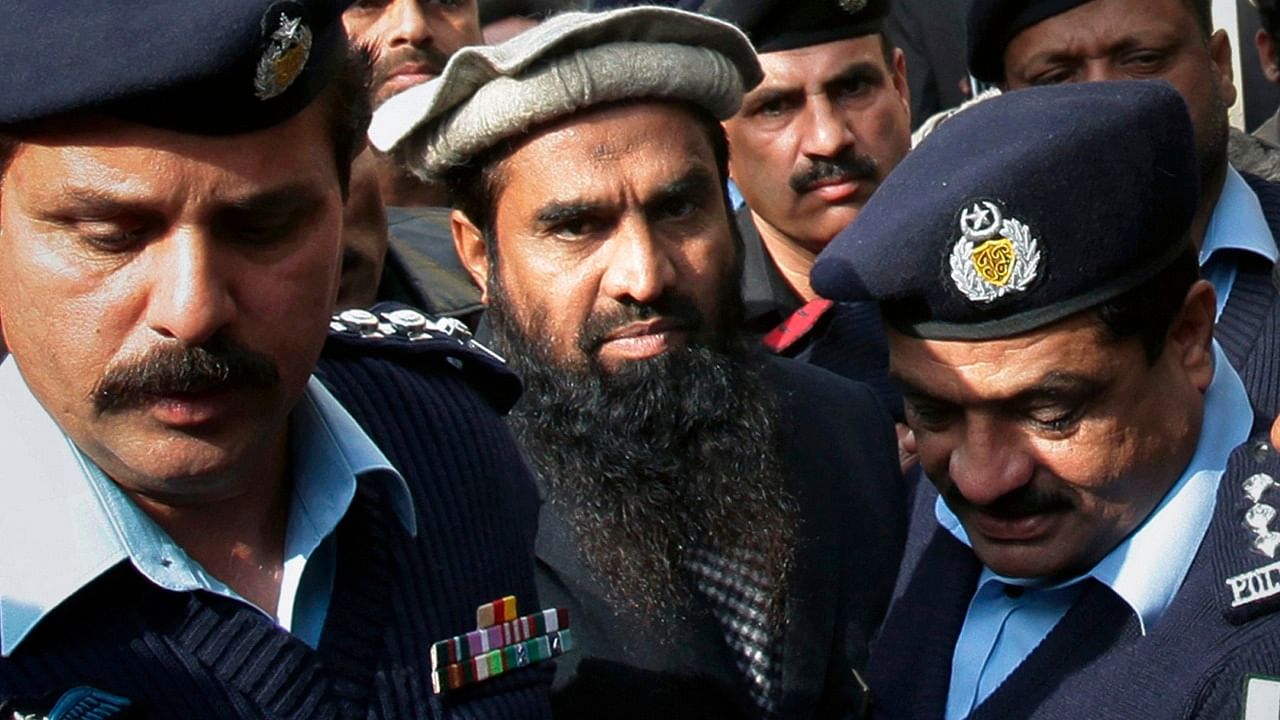
Even as a court in Pakistan on Friday sentenced the coordinator of 26/11 attacks and the Lashkar-e-Taiba (LeT) ‘commander’ Zaki-ur-Rehman Lakhvi to 15 years in prison in a case related to the financing of terror, New Delhi dismissed it as yet another farcical act by Prime Minister Imran Khan’s government in Islamabad.
New Delhi alleged that imprisonment of Lakhvi, as well as that of his mentor and the LeT founder Hafiz Saeed and the warrant issued for the arrest of the Jaish-e-Mohammad chief Masood Azhar, were all “farcical actions” by Pakistan Government to get reprieve from the Financial Action Task Force (FATF) – an intergovernmental organisation to coordinate initiatives around the world to counter money-laundering and terror financing.
Islamabad has been desperate to get the FATF to remove Pakistan from its “grey-list”. A review of the progress made by the Government of Pakistan in plugging loopholes in its measures to stop money laundering and flow of funds to the terrorists and the terrorist outfits would be on the agenda of the plenary of the intergovernmental organisation next month.
Anurag Srivastava, the spokesperson of the Ministry of External Affairs, said that the timing of the recent actions against Lakhvi, Saeed, Azhar and others in Pakistan clearly suggested “the intention of conveying a sense of compliance” ahead of the meeting of the Asia Pacific Group of Money Laundering and the FATF plenary meeting next month.
“It has become routine for Pakistan to come up with such farcical actions prior to important meetings,” said the MEA spokesperson.
Lakhvi, the ‘chief of operations’ of the LeT, was arrested last week for raising fund for financing terrorism using a dispensary in Lahore in Pakistan as a front.
A court on Friday found him guilty under three sections of the Anti-Terrorism Act (ATA), 1997, of Pakistan. The court sentenced him to five years in prison in addition to ordering him to pay Pakistani Rupees 300,000 as fine.
Lakhvi had coordinated the 26/11 terror attacks in Mumbai from a “control room” set up by the LeT in Karachi in Pakistan. He had been arrested a few weeks after the 26/11 strikes – along with Hafiz Saeed, who had masterminded the attacks, and others. They all had been released later as the trial of the case had not made much progress in the court in Pakistan. Islamabad had claimed that New Delhi had failed to provide enough evidence to convict Saeed, Lakhvi and others.
The recent legal proceedings against Lakhvi and Saeed – both designated as terrorists by the UN Security Council – were not related to the 26/11 cases though.
Saeed was arrested by the law-enforcement agencies in Pakistan in July 2020. The courts in the neighbouring country so far sentenced him to 10, 11 and 15-and-a-half years in jails after he was convicted in five of the several cases related to terror financing, all prison terms to be served concurrently.
Besides, a court in Pakistan on Thursday also issued an arrest warrant against Jaish-e-Mohammed (JeM) chief Masood Azhar in connection with cases related to terror financing. Azhar is accused of masterminding several terror strikes in India, including the February 14, 2019 attack on the paramilitary personnel at Pulwama in Jammu and Kashmir.
Srivastava, the spokesperson of the MEA, said in New Delhi that the entities proscribed by the United Nations and the individuals designated as terrorists acted as proxies for establishment in Pakistan to fulfil its agenda against India. “It is for the international community to hold Pakistan to account and ensure that it takes credible action against terror groups, terror infrastructure and individual terrorists,” he said.
The FATF on October 23 decided to keep Pakistan on the “grey list” for a few more months, as it failed to completely plug the loopholes in its legal mechanism to detect and stop the flow of funds to terrorist organisations. The intergovernmental organization noted that the Pakistan Government had made progress in implementing 21 of the 27 measures prescribed by it. It decided to give Imran Khan’s government in Islamabad time till February 2021 to implement the six remaining measures.
The six points, which the Pakistan Government failed to act upon, included the implementation of targeted financial sanctions against individuals and entities designated as terrorists and terrorist organizations by the United Nations Security Council, like Saeed, Azhar, Lakhvi and Dawood Ibrahim.
